 This morning on the Sidewalk and at Sunday service tomorrow, I begin a series through the prophet Jeremiah’s book. What got the ball rolling in my thought process—on why did I pick Jeremiah as the next series—was a question I had been asking since my alma mater’s (Crown College’s, aka St. Paul Bible College’s) 100th anniversary’s gathering a few years ago. At one of the weekend’s events, they gathered together the previous Crown presidents for a Q&A. The final question was, “What is one thing that isn’t being taught at Crown College that needs to be taught at Crown College?” The last answer came from the oldest and most senior of the former Crown College presidents (he was back in the 70s; I was there ’81-’84), Dr. Grubbs, a kindly and wise Christian & Missionary Alliance elder statesman; he said: “How the students will endure persecution.” This stuck with me. For years, now, his answer has been festering in my heart and thoughts during my time here as a pastor in the Hill: Am I teaching my flock how to endure persecution? Do I even know how to teach them how to endure persecution? So, I have been asking myself, “How do I teach my CPC in The Hill flock to endure persecution?” As I was finishing up my sermon series through Galatians, I had been praying, “What’s next?” The Book of Jeremiah seemed to be what was being presented—almost everywhere I turned (books and material I was reading; podcasts I was listening to; casual conversations) pointed to Jeremiah. So, I am preaching through Jeremiah—both to listen for myself and to help my people reflect on that question: “How does a Christian, a church, endure persecution?” And then, hopefully, answer the question for myself, “How, as a pastor, do I train/teach my CPC in The Hill flock to endure persecution? How?” I think Jeremiah will help answer all these related questions. *We will get to what “persecution” is in the coarse of the series.
0 Comments
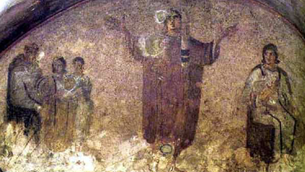 Some sermon prep thoughts . . . the fuller text is Galatians 3:23-4:7 . . . and yes, this is a Christmas Season Sermon text . . . See Galatians 4:4. The part I am reflecting on is the well known Galatians 3:27-39: “For as many of you as were baptized into Christ have put on Christ. There is neither Jew nor Greek, there is neither slave nor free, there is no male and female, for you are all one in Christ Jesus. And if you are Christ's, then you are Abraham's offspring, heirs according to promise” (Galatians 3:27-29). I am not sure that we fathom how radically deconstructing these words would have been for the Greek, Roman, and Jewish man, especially male head of households, who were also masters of household slaves . . . nor can we (but we should) grasp the radical reconstruction and liberation these same exact words would have been to the Greek, Roman, and Jewish women and slaves and free (emancipated) slaves, who had no home or legal status whatsoever . . . interestingly we forget that Paul just mentioned sonship (“you are all sons of God, through faith,” v. 26) and will soon talk again about sonship and heirs (Gal 4:1-7), that is, being sons of God. I know we like to be modern and relevant and say “sons and daughters of God,” attempting to get past the so-called ancient gender-bias; but this is both unwarranted and does injustice to the text in its culture—depriving the Christian, especially the female Christian, of its impact. “Sons” were everything in the Greek, Roman, and Jewish world. They got everything. They had far more respect. They got citizenship. And if you were the first born male, an heir to family wealth, possessions, land, and legacy. The goal of marriage to the Greek and Roman was to produce a legitimate male heir citizen for the Empire. So, to deprive the female Christian direct title “son” with all of its rights and privileges (as it would have meant to the ancient world reader) would simply be not right, unfair, unjust, unbiblical . . . it would not be Christian. The impact of such sonship on the Jew, the Greek, slave or emancipated slave is left with no contemporary translative spin—as it should be. Yet, our cultural sensitivity (although sincere and well-meaning at times) toward the gender-bias we have robed the sister in Christ of the applicable impact on her status as a “son of God.” And, for sure, this simple slight of hand turning “sons” into “sons and daughters” makes us (you know I mean, us brothers) feel as if we’ve (they’ve) solved all the gender-bias (male-dominating, male-centrism) within Christianity and its religious systems, habits, and attitudes with one easy “translation” fix. In some since, this translative adaption helps to lessen the power of this text to deconstruct our male-centeredness and robs the church from allowing the place of the female to be reconstructed into the place of a “son of God.” It is no wonder the early church grew as it did . . . and it is no wonder why women were especially attracted to the fulness of time when God sent his son, “born of woman, born under the law, to redeem those who were under the law, so that we might receive adoption as sons” (Gal 4:4).
 “Whoever does not receive the kingdom of God as one receives a homeless person will never enter it.” Here are some streams of thought that sprung from my sermon prep on Luke 18:15-30 (which is posted fully at the end). For now, this passage is two stories that are most definitely linked together: Infants and children being brought to Jesus for a blessing, being told that the kingdom of God belongs to them, and a rich young ruler who asks how he may obtain eternal life. Additionally, the previous Wasted Blog post is a part of this stream of sermon prep thought: A blunt text, rationalizing, and a confession: a brief reflection on Luke 18:22. There is little doubt that this is about the gospel and the poor: who are we?The wider section of Luke 14-18 that we have been journeying through during the Saturday Sidewalk Sermons and Sunday morning sermons reveals whom we are to seek and welcome to the Table of God‘s Kingdom--that is, whom are to be invited to salvation in Christ, that is eternal life. There is little doubt, the invitation is for the least among us . . . don’t get me wrong, of course, the wealthy and well-off and those who have the privilege and blessings of this age’s systems and structures are invited to come sit with them (it seems this is the Gospel process). In our current passage (Luke 18:15-30), the young rich ruler is instructed to give his wealth to the poor . . . two things to be noted here: 1) for those that didn’t catch this earlier on my facebook feed, this principle was understood by both Jesus and his disciples as a principle to be followed broadly by the rich if they were to be followers of Jesus; and 2) this was what Jesus was modeling--something this young rich ruler could not, in the end, imagine doing, for he walked, sadly, away from Jesus’ gracious invitation to enter the kingdom of God. Perhaps on this Day of giving thanks, we can find a way to give away what we have to the least among us. Most of us will give thanks around a Thanksgiving table for the bounty God has given to us--often accompanied by a comparison to those who have little or nothing (“Lord, we thank you for what we have, for we know that so many are not as fortunate,” et al.) . . . this is more in line with the Pharisee in the preceding parable, who compared himself to others. The parallel in the Luke 6 Beatitude: The kingdom of God belongs to the poorA thought from my sermon text, Luke 18:15-30: the reference to the kingdom of God belonging to the children means these two stories are a poor vs. the rich contrast and we should suspect that deconstruction, a reversal, is afoot: V. 16: But Jesus called them to him, saying, “Let the children come to me, and do not hinder them, for to such belongs the kingdom of God” (ἐστὶν ἡ βασιλεία τοῦ θεοῦ). Note the parallel: Luke has already told us back in chapter 6 that “Blessed are you who are poor, for yours is the kingdom of God” (ἐστὶν ἡ βασιλεία τοῦ θεοῦ. 6:20). And surprise, surprise, the very next thing is a scene of a rich young ruler wanting eternal life (i.e., entering the kingdom of God), who is then told to give to the poor, and walks away from (eternal life!) “because he was wealthy.” Recall how Luke presents the Kingdom Beatitudes back in chapter 6 . . . he parallels the poor/kingdom (6:20) with “But woe to you who are rich, for you have received your consolation” (6:24). I’ll leave it right here . . . Love God, Love Your NeighborLuke 18:16 (just a verse from my whole text, Luke 18:15-30): “But Jesus called them to him, saying, ‘Let the children come to me, and do not hinder them, for to such belongs the kingdom of God.’” When the rich young ruler had heard Jesus say that the kingdom of God belonged to incomplete adults, those not fully human, that is children, this begged a question pertinent to his station and social status (which was good because he was wealthy, which meant he had a name that counts and a status that allowed all the privileges and, of course, he was a grown male which made him fully human). That question was, “Good Teacher, then how do I inherit eternal life*?” He obviously knows how to inherit riches: be born in a legacy family and be a grown male—this is the Rome-way. It is not Jesus’ way . . . this is what concerns that rich young ruler. As it should. As it should also concern us. While Jesus is far more than a mere Teacher as the rich young ruler had addressed him, he picks up on the word “Good” to help the young rich ruler grasp he is asking a first-commandment question—God is the only good, so remember, Love the Lord Your God first—but in the next breath Jesus directs the wealthy ruler to the second--which is like the first (cf. Matthew 22:39)—command, namely to Love Your Neighbor. Thus, give-God-all-you-got is to be met with selling-all-you-got-and-giving-it-to-the-poor, these are the twin sides of inheriting—not earthy riches, that’s easy, just be born with a name and have the right address—of inheriting eternal life. Not sure we’ve actually come to grips with this side of the gospel . . . it’s there, right in our text for Sunday morning (Luke 18:15-30). *The kingdom of God, eternal life, and being saved are all interchanging terms and concepts in Luke. An ellipsis: whoever models Jesus gets to enter into the kingdom of GodI grant the last of this thread is far more application than exegesis (but it’s that, too), yet it is an application that is a faithful reading and dynamic equivalent [you’ll see I do some translating here] to Luke’s and Jesus’ narrative intent (and of the Greek) found in Luke 18:15-30, specifically, verses 16-17: “But Jesus called them to him, saying, ‘Let the children come to me, and do not hinder them, for to such belongs the kingdom of God. Whoever does not receive the kingdom of God like a little child will never enter it’” (ESV). There are a number of things that are before us in the text, for they would have been before both the original audience of disciples and Pharisees, and, as well, those to whom the Gospel was written, namely Theophilus’ church community: 1) As already mentioned, infants and children would have been considered not fully human, incomplete adults, one the lower tiers of human hierarchy, both in the Jewish and the Greco-Roman world; 2) Children/infants simply would not have been presented, especially in public, to any Rabbi (and I note that Jesus is referred to by the rich young ruler as Teacher, aka a rabbi); 3) There would be ritual impurity amid the presentation of the infants that would have been improper for Jewish Rabbis, but obviously Jesus is impervious; and 4) Finally, there is an ellipsis in verse 17 that needs to be understood. Allow for an explanation of the ellipsis before moving on to my application (which reveals the intent of Jesus and Luke here): a grammatical ellipsis, whether written or spoken, is when some words are missing yet assumed, offering some balance to the thought or sentence that is implied by the author and supplied by the hearer/reader. Examples: “John saw two hawks in the sky, and Bill saw three” and “Amanda is managing the restaurant Thursday, and Joseph is Friday.” The second example is like our Luke 18:17 ellipsis, in that the verb “manage” is left out but is clearly intended. The ellipsis in Luke 18:17 is the verb “receive.” The ellipsis is masked by the English word “like” (i.e., “like a child”). The word “like” implies to the English reader that it is the children we should be like. However, the ellipsis being crafted here is to imply that it is the “receiving” that we are to be like. Here’s my translation so you can here and see how the ellipsis works:
The “infants” and “children” are not coming or receiving Jesus in this story. They are not coming to Jesus because of something about them--we infer this, but it is not there in the text and the social/cultural location suggests otherwise. And, it is the parents who are bringing them to Jesus and Jesus is receiving them. Thus, the set up for the intended ellipsis. We should make a narrative link to what Jesus is doing. This is exactly what Jesus is modeling, “receiving children.” He is not receiving children as a child or like a child would--that’s our hallmark-card spin on it--but Jesus is doing the receiving, the welcoming of the children. This reading of the text, and hearing the cultural view of humans that is at play, allows us to apply this warning concerning the unavailability of the kingdom to those who do not welcome/receive children because Jesus has reversed the poles in His kingdom. Now, if we read--as we should--the other aspects before us in this text, namely infants/children would have disturbed the piety of a rabbi (i.e., the clean vs unclean) and the view that receiving them counters the tiered humanity prevalent at that time . . . it would be fair to render this verse: “Whoever does not receive the kingdom of God as one receives a homeless person will never enter it.” Of course, you can change “homeless” to be anyone whom you believe is less than human or unclean . . . and not only believe, but live in such a way that your modeling is nothing like Jesus’ model . . . and the danger? You will not enter the kingdom of heaven. This is affirmed by the next story of the rich young ruler choosing not to model Jesus and turns away from the kingdom. Luke 18:15-30 (ESV)
 While the Pharisees and scribes grumbled that Jesus was receiving tax collectors and the marginal, the uneducated, outcasts living in “the streets and lanes of the city,” and “the poor and crippled and blind and lame” (14:21), eating with them, Jesus asked them a question:
The question sets up an expected answer: “No, no-one would do that!” Such a decision puts the 99 at risk (stop thinking Jesus means for us to assume the shepherd left the 99 well attended—that would spoil the story all together—not sure we are to assume nor fill in the blanks). Simply we have, you see,“Lost sheep happen.” Still, the angle Jesus shoots for is dangerously shocking: this rather well-off Shepherd (having 100 sheep would have indicated he leaned toward being a more wealthy Shepherd) goes and seeks his lost sheep, carries it home, and everyone rejoices. This is the counter to the grumbling of the Pharisees and scribes that Jesus was welcoming and eating with the likes of those strays from Galilee and the marginal he'd been picking up while on his way to Jerusalem. While it is good to see the Shepherd as a picture of Jesus, this leaves the listener/reader with nothing to do but contemplate how much Jesus loves him. A good thing and important, sure, but that’s not Luke’s point. This is a counter to the Pharisees and scribes, which should indicate what we have here is a counter-intuitive correction to the church’s proclivity toward doing exactly what the Pharisees and scribes were doing: neglecting the poor and marginal and socially unacceptable, whether it be to affirm the cultural and socially tiered-hierarchies (both church and outside the church) and/or to not be so unwelcoming of such among them as a church and/or creating and maintaining institutional systems that affirms and sustains the haves/have-nots at church (cf. the problem in James). This is exactly what the previous Banquet parable was about in Luke 14. Additionally, the interlude on discipleship just prior (14:25-33) instructs us that discipleship is following Jesus, and thus we have our marching orders here in this (and the next two) parables of Luke 15.
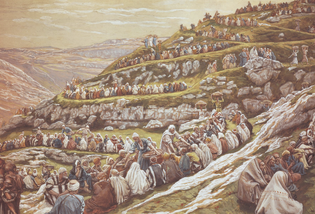 The feeding of the 5000 in Mark 6 is a miracle story that reveals who Jesus is—most assuredly. Yet still, Mark’s purpose in writing a gospel for the church community in Rome to be read out loud at the symposium following their supper gatherings (what we might call a church gathering) was to build the church, mature the congregation’s faith, and teach what it means to follow Jesus and acknowledge him as Lord, raised from the dead. More so, Mark’s Gospel, including this feeding of the multitude story, was (and still is) to prepare the church for the persecution, hardship, and the difficulty of being the church while staying faithful to its mission and Lord. The Mark 6 feeding of the five thousand is as much about who the church is as it is about who Jesus is. While the miracle itself is revealing of who Jesus is and certainly links the reader back to the Old Testament Exodus under Moses (thus, picturing a new exodus under One better than Moses, giving the new mana), this is a discipleship story that has a discipleship point to be made to the readers/listeners. First, three times in the space of five verses the word “desolate” (“desert,” actually, “wilderness” is best) is used in a fourteen-verse story—over a third of this vignette on the feeding the 5000 focuses on where this event takes place. And, if we count the reference to “green grass” (v. 39) where Jesus had the crowd sit to be served, this story does indeed focus the reader/listener’s attention on the place of this story; thus, giving a clue to its importance on the subject of discipleship--what does it mean to follow Jesus? Second, the story is mostly about the newly appointed “apostles,” the twelve “sent ones” (6:7-13), who had just returned (v. 30) from the mission Jesus had sent them. The story begins with their return, reporting, and Jesus taking them to some spot—a “desolate place,” a grassy space of wilderness—to eat and rest. “Leisure” (as in “had no leisure even to eat,” v. 31c) is an unfortunate word choice of the ESV, for it gives the impression of fun, earned vacation or a weekend (perhaps), or an extended break from work—here, it simply means a few moments to rest so the disciples can eat. Then, after finding their own “desolate” place to eat, the crowd from nearby towns followed and found “them” (v. 33)—Jesus and the disciples, who had just been going through their towns preaching the kingdom of God. After Jesus spent some time teaching the crowd, the apostles “kindly” mentioned to Jesus that the crowds, who had followed “them” to their desolate place (v. 33), needed to find their own food in some other place (vv. 35-36). While we often focus on Jesus in this story, Mark keeps the “apostles” front and center. Just after the disciples request the crowd be sent away to buy their own food, Jesus instructs them: “You give them something to eat” (v. 37a)--they were their eating (by-the-way) and obviously had food; something from their own resources. Still complaining, the disciples sarcastically say, “Shall we go and buy two hundred denarii worth of bread and give it to them to eat?” (v. 37b). (The disciples really wanted to get this crowd to go away!) Paying no mind, Jesus asks them to gather what they had left from their food—“Five [loaves], and two fish” (v. 38c). Then, Jesus instructs the 5000 to sit in groups of hundreds and fifties (like Moses did) and after blessing this paltry amount of food for such large a crowd, gives the food to the disciples to set before all the people—in other words, to serve the crowd food in that desolate place they had originally found to “get away and eat themselves.” A quick aside: The miracle in this story is very linked to the disciples, for the multiplying of the bread and fish come, not in some surreal miraculous moment, but through the serving of the bread and fish by the disciples—so even here, the story focuses on the disciples. As you can see, while the feeding miracle stands out (and is, of course, important), but the story has the multiplication of the loaves and fish in the serving by the disciples to the people. The content of this story focuses our attention on the disciples—more so, on a discipleship moment. So what’s happening here? Yes, at the very moment the new exodus is revealed, displayed in the feeding of the 5000, and Jesus is revealed as the ultimate Moses, the disciples first find a spot to eat and are interrupted by the crowd who had followed “them” to this desolate place, and, then, wanted to turn them away when it was time for the crowd to eat. There is some irony here for sure. As I had mentioned before in a previous Facebook post: I believe, the readers on this side of the text are to hear that Jesus is setting his disciples up for a lesson—a learned experience, a discipleship moment—in what it means to be a disciple, a follower of Jesus. We, his church, Jesus’ disciples are how the bread and the fish multiply. This is revealed in the focus on the disciples and the desolate place in this story. Later, after the resurrection and as the church increased, this can be seen in the multiplying of tables (in supper rooms) of gathered believers starting in Jerusalem and spreading all the way to Rome and eventually filling and overtaking an empire. We can see this revealed in the multiple references to supplying the needs of the poor in the New Testament. And, that the original (not so much, sadly, later in church history, even up to now) gathering of strangers and unequals (i.e., gathered churches) provided a platform and venue for the poor’s needs to get met, including a meal. The Lord’s supper was a supper after all. We learn of discipleship here: following Jesus is going to interrupt a disciple’s life. Needs are going to be met out of His disciples resources. Meeting needs in inconvenient space, space we thought was for our leisure, is a sign that the Kingdom of God has come. It is proclaiming Jesus—of course use words. But that’s what the disciples did on their short-term mission just prior to this episode. So, the narrative point (Mark’s narrative point) was to move the disciple’s notion of ministry beyond words to illustrating the arrival of the Kingdom in Jesus. Remember, the miracle of multiplying the food was through the serving of the disciples—just at the time they needed rest and needed some leisure time. Ministry and mission, meeting needs and serving—all should be expected to interrupt and invade our leisure space.
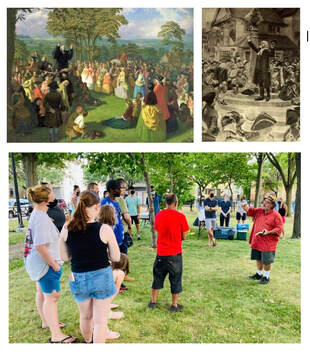 John Wesley's Journal, March 31, 1739: “In the evening I reached Bristol, and met Mr. Whitefield there. I could scarce reconcile myself at first to this strange way of preaching in the fields, of which he set me an example on Sunday; having been all my life (till very lately) so tenacious of every point relating to decency and order, that I should have thought the saving of souls almost a sin, if it had not been done in a church.” Because Anglican Church leadership had forbidden and barred their churches from allowing George Whitefield from preaching in their pulpits, he, then instead, took to the open air to preach. On February 17, 1739, Whitefield preached, for the first time, in the open air to about two hundred coal miners at Kingswood (near Bristol, England). Within three weeks, thousands began crowding to listen to Whitefield’s preaching. Soon, he called on John Wesley to come help him in this open air preaching. Though Paul and other New Testament figures took to the open air with the message of the gospel, Whitefield and Wesley (re)discovered (if you will) in these (as one author put it) “unsettled conditions,” open air preaching among “the neglected Kingswood colliers” (coal miners).
Soon even John Wesley was refused access to Anglican pulpits. Yet, that did not stop Wesley from preaching the gospel: On one occasion, because he was blocked from a pulpit in Epworth, his father buried just outside that church, Wesley famously stood on his father's grave and began to preach. Many came to listen. Whitefield and Wesley reached the “neglected” multitudes among us (which I call the “forgotten elect”*) with their open air preaching. And, none can say these outdoor masses weren’t discipled to mature their faith, for much of our present day discipleship is borrowed and built on Whitefield and Wesley’s “methods.” Now mind you, I am no John Wesley nor George Whitefield, and I haven't been banned from any pulpits (that I know of anyway) and, as far as I can tell, I am in good standing with my denomination, but yet, still, almost everyone who stands in front of me at our Summer "In His Midst" Park BBQs or on the sidewalk each Saturday does not attend church—so, for them it is moot why I preach outdoors, this is the only Gospel, the only church, the only pastoral care, and for some the only discipleship they are going to ever get. They are the neglected among us that regular, ordinary pulpits are not going to reach—by design, default, habit, or ignorance, it matters not. We cannot do ordinary church in a place where there are so many, what I call, the forgotten elect. No matter which theological background you come from, most of these good sinners will never enter a church building until it is too late. So, the Hill is my parish. Yes, there will be distractions and required other duties, but while God gives me breath and enables, I will seek to preach and reach these forgotten elect. *In this way, I am a little more Whitefield than Wesley, I get that. 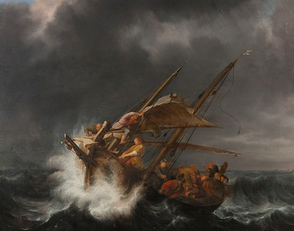 In the first scene we will look at this Sunday, we find Jesus and the disciples in a boat at sea during a terrible storm (Luke 8:22-25). The disciples, among them some who were skilled fishermen, knew it was very bad, life-threatening, and awoke Jesus, who was sleeping on deck, to come help bail. All hands on deck! Jesus wakes, then precedes to rebuke the storm, and all became calm. That is when Jesus asks the disciples, “Where is your faith?” (v. 25). Despite the peril of the storm, it was their imagination, however, that needed bailing, not the boat. They feared the storm; not Jesus. That was the problem. And, that was all about to change. When Jesus asks the disciples, “Where is you faith?,” we tend to hear “You don’t have enough faith” as if Jesus’ question is about quantity. Quantity of faith. We assume Jesus is questioning the amount of faith that the disciples have—and by extension and application, questioning the amount of our faith. Of course, this “application” more typically is used as a proof text of someone else’s lack of faith (not mine!), “You don’t have enough faith” or “That Christian just doesn’t have enough faith.” The issue of “faith” here, however, is not about amount or size or depth or quantity. Of mine. Or even of yours. Nor is this question about “faith” meant for introspection. Naval gazing. In other words, the question is not about the private, individualized amount of faith that the disciples had . . . nor of yours and mine. The question was all about Him. About Jesus. Who is He? This scene is the point in the story when the disciples were confronted (as you and I should be even now in reading the story) with who this wandering-teacher-Rabbi actually is: from the disciples’ point of view, Jesus entered the boat as a teacher, master, someone in the boat who can be called upon to grab a bucket and start bailing; then after the rebuke and the winds calm, the disciples fear he is more than a mere teacher. This is the scene that is before us. Through how he has crafted his narrative, Luke has given a whole other referent concerning “faith.” The disciple's faith. My faith. And, your faith. There are three hints that allow us to infer that Jesus is more concerned about who we believe Jesus is. First, we have the wider context. Earlier we encountered two scenes where Jesus praised someone’s faith: the Centurion when Jesus turns to the crowd, marveling and said, “I tell you, not even in Israel have I found such faith” (7:9) and, then, to the prostitute that had crashed the Pharisee’s supper party, wet Jesus’ feet, drying them with her hair—and in front of all the guests— He announces, “Your faith has saved you” (7:50). Thus, we can (and should) read the question “Where is your faith?” as “you all haven’t figured out yet who I actually am, unlike the Gentile Centurion and unlike the prostitute, who both figured out who I am.” Second, after Jesus calmed (more so, rebuked) the storm, Luke tells us that the disciples “were afraid” (8:25b). They feared. Not a scared kind of fear. But, the fear one has at the sight of a catastrophe happening right in front of you. The fear one has on a boat in the middle of open water during a life threatening storm. Now their fear has the right object: Jesus. (In the next miracle scene, we also encounter “fear,” namely those who had observed the formerly demon-possessed man clothed and in his right mind sitting at Jesus’ feet (vv. 35-37)). Third, the narrative sets us up to ask the question “Who is this?” as the disciples had done. After Jesus calms the storm, the disciples, rightfully, now in good fear, asks, “Who then is this, that he commands even winds and water, and they obey him?”(8:25c). The reader—you and me—already knows from the birth narratives this is no ordinary man. Now we are learning (hearing) what kind of non-ordinary man Jesus is. In the next scene, the question the disciples ask is answered by a demonic-possessed, homeless, naked, man sleeping among the tombs: “Jesus, Son of the Most High God” (8:28c). Amid miracles scenes where Jesus is demonstrating his authority over creation and creation-destroying demonic forces, we are to learn that Jesus is the appropriate object of faith—and fear. We are to be like the Gentile Centurion and the prostitute and not like the disciples. Yes. That’s right. Not like the disciples in that boat. We are to learn from the disciples’ misplaced fear of forces they (we) cannot control (aka, the storm and the demonic-forces). Jesus is the right and appropriate object of fear. The issue here with the question “Where is your faith” is not about some faith we must muster up (that’s makes faith us-centered, you-centered, me-centered); but a faith, that is truly believing and a loyalty (the meaning of the word “faith”) that surrenders to the One who has all authority: Jesus, the Son of the Most High. This is important, first, to the disciples in the narrative, for soon they will be given the commission to imitate Jesus’ authority and mission (9:1). And, we, who are in front of this text, are also to learn that Jesus is the right—and only—object of our faith, the right object of our fear: Jesus, the Son of the Most High who has the power and authority over creation and over creation-destructive powers (the next miracle scene). For, we, too, are to be his disciples, bearing witness to this Jesus.
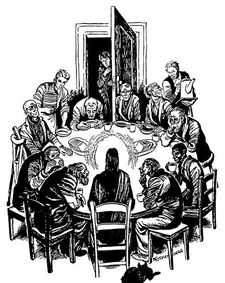 Sermon prep for and thoughts from my study of the last half of Luke's Sermon on the Plain (Luke 6) . . . Church, imagine a trafficked woman and one who used to enslave women sitting at that Table, after breaking bread, having a supper, and after lifting that fourth cup together to celebrate Jesus as Savior and King . . . imagine a beggar and a wealthy man . . . imagine a wife and her husband, who'd normally have been found with a temple prostitute or at a similar supper using women as entertainment . . . imagine young boys and men who had, until recently, frequented similar suppers where such young boys were entertainment . . . imagine . . . imagine the early church gathered at that Table now ready to listen to someone read the parchments containing Luke's Gospel . . . imagine . . . Imagine hearing the Sermon on the Plain being read (Luke 6:20-49) . . . imagine they all hear, not only the blessings on the poor and the cursing on the rich (vv. 20-26), but hear “love your enemies,” “do good to those who hate you,” “pray for those who abuse you” (vv. 27--29). . . “do not judge” . . . “do not condemn” . . . “forgive to be forgiven” (v. 37) . . . and “give and lend without regard to getting anything in return” nor “demand back what was taken” (vv. 35, 38) . . . imagine those who were around those first Tables, not only hearing these words, but doing them . . . Sometimes I think we have it way too easy at this church stuff and that has dulled our hearing . . . and flattened our doing . . . and it is no wonder our houses crash when those winds come . . . it is not enough to be hearing His word and, frankly, it is not enough just to do the word where it is easy and socially and culturally safe. Other Luke 6 Sermon on the Plain thoughts . . .
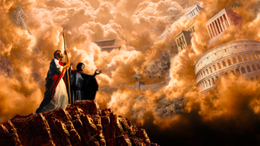 “Again, the devil took him to a very high mountain and showed him all the kingdoms of the world and their glory. And he said to him, ‘All these I will give you, if you will fall down and worship me.’ Then Jesus said to him, ‘Be gone, Satan! For it is written, “‘You shall worship the Lord your God and him only shall you serve’” (Matthew 4:8-10). Recently I was in a conversation regarding Jesus’ temptation in the desert. I have always found it rather remarkable that Satan offered to Jesus what already belonged to Him, namely “all the kingdoms of the world.” The temptation wasn’t to possess the kingdoms—Jesus already possessed them—but in how Jesus would respond to the offer. You and I would have responded, “These are already mine.” Jesus could have responded this way and it would have been all true. Jesus’ response could have been founded on privilege, His status with the Father. But yet, He did not respond in this way. Satan was attempting to get Jesus to act, to respond from His position as God’s Son. We can see this with the first temptation: “If you are really God’s Son, turn these stones into bread.” In the second, the same: “If you are the Son of God, jump—and God will catch you. Prove it.” In each case, however, Jesus did not respond from the privilege of His status as God’s Son. If He would have, that would have been the end of it—the end of it for all of us. No cross. No salvation. You see, Jesus did not give in to the temptation to assert His special status. No. Not at all. Jesus responded with the only thing that mattered (albeit in different ways, but still each time the same): “I will keep God’s word; I remain faithful to God’s covenant.” You and I—as I have heard so often—like to boast in our special status with God. For some reason (pride, most likely) we think we impress the non-Christian world with this stand. This is not the way. While this is true in that a Christian is a son of God, an adopted child of God, the temptation is to prop ourself up in front of others with this position rather than do what is necessary and the only thing that matters: will I keep God’s word and be faithful to His covenant? Sure, you say you are God’s child, you say you are a king (or queen as it may be). I get the royalty you claim. I know the proof-texts. But what we need to know is: will you keep God’s word and be faithful to His covenant? The temptation was not in possessing all the kingdoms of the world, but in humbling Himself—even to the point of death on the cross (e.g., Philippians 2:5-11). This is a real temptation for the Christian: To assert one’s privileged status with God before a watching world. I see this all the time on social media and in conversation among Christians (and in the presence of non-Christians). I even hear this in sermons, instructing Christians to assert their privileged status with God. While most certainly true, this is not the way of discipleship, not the way of following Jesus. All that matters is one thing: God wants to know, the watching world wants to know, even Satan wants to know, will you (will I) keep God’s word and be faithful to His covenant?
 “And on that day a great persecution began against the church in Jerusalem, and they were all scattered throughout the regions of Judea and Samaria, except the apostles” (Acts 8:1b, NASB). “Peter, an apostle of Jesus Christ, To those who reside as aliens, scattered throughout Pontus, Galatia, Cappadocia, Asia, and Bithynia, who are chosen according to the foreknowledge of God the Father, by the sanctifying work of the Spirit, to obey Jesus Christ and be sprinkled with His blood: May grace and peace be yours in the fullest measure” (1 Peter 1:1-2, NASB). ❉ ❉ ❉ ❉ ❉ ❉ ❉ ❉ Imagine. If you can. You are a small gathering of Christians in the first century. The new born church that we meet in Acts, now scattered throughout the Gentile world. A very minority church in the Roman Empire up to about 150 C.E. By now, most of Christian fellowship, instruction, and worship was done in homes, catacombs (underground cemeteries), workshops (that were also apartments) or hidden away, or above the streets, in tenement-styled, stacked row building apartments. Imagine. The “gathering together,” what we could have called “a church,” is still illegal, at least not recognized as religio licita, a permitted cult or religion in the Empire. Imagine. That fourth and final cup after the meal was over (Luke 22:20; 1 Corinthians 11:25), still treasonous, lifted, now not to Caesar, but to honor Jesus, risen and Lord. Gathering together was still very dangerous. A non-domestic building, set aside for Christians to gather for worship, was still many decades off, probably 200+ years in the future. The earliest separate building devoted to Christian use was in eastern Roman Syria at Dura Europos on the Euphrates River. Originally a house that had come into a Christian's possession and was remodeled for church gatherings in the 240s CE. But still, it wasn’t like church buildings were popping up all over the place after Dura Europos. It would still be another century before non-domestic buildings would more readily (and permitted to) be built or designated specifically for gatherings of believers to function as a “church building.” And, still, even around 350 CE, there won’t be a boom of church buildings going up everywhere.
We, too often, work backward from our building-experienced-church to the New Testament, imagining the church we read of in Acts (and Romans, 1 Corinthians, Philippians, et al.) or read of the first century church as being all made up of these small groups of somewhat organized believers that gather (albeit) in homes as if they are free to do so often, let alone, weekly. Yes, of course this happened. Just not as neatly as we imagine. The church of Acts and the early (first century) church is far more scattered, less free to meet, than we imagine. A clandestine church is more likely a better way of thinking “church” for the first 150 years or so. We simply do not have an imagination of the church as revealed in the New Testament. Why is this important? First, it, that is, the house-church, is how God choose to reveal what He meant by church, a gathered-church. Yes, the difference between “form” and “element” is important; but form develops habits that sneak in to determine element. The form of the New Testament house-church developed habits that taught something about the nature of church as do separated buildings teaches something about church. And, secondly—and to the point in this piece—churches in the New Testament and in the early church didn’t have the privilege of a legal means of or a culturally acceptable means to gather once a week on a day that is (like our Sunday) a “day off” in what would be, more than a millennia off—something come to be called a “weekend.” Today, with this COVID-19 crisis, what we have is a very non-ordinary time. For us, here in America, at least. For quite some time, we have been pretty much guaranteed the freedom to gather together as churches. And boy do we. All types of church. Big. Medium. Small. In all types of buildings. While there are some home-church movements, most church congregations meet in separately addressed, non-domestic buildings of some kind. Yet, still, even now, there are many churches throughout the world that do not have the freedom to gather together—some because they are oppressed; some because they must hide; some because there is no such thing as a weekend; and, some are simply too poor and exist in under-developed or third world nations (or, even, neighborhoods).[§] These churches are much closer to the young church than we can imagine. But, we are beginning to imagine. Still, it is hard to imagine a church as a “scattered church.” However, I believe we need to have this imagination now.
We also need to understand that these “scattered” would not have had “churches” to move into, or established fellowships to embrace, and no places into which they’d be welcomed as “churches.” They were indeed “scattered” without (at least immediate) access to the Apostles (who stayed in Jerusalem, Acts 8:1)—which would have meant no communion (as we know it), no qualified preaching or instruction from the Word and/or Words of Jesus, et al. Indeed, they were scattered. In the 1 Peter passage, we have a church that is described as geographically “scattered” throughout Asia Minor. And, of course, this “scattered” are small household-churches, gathered together, but still, we need to embrace the term “scattered.” This text, also, tells us that nothing is lacking in this “scattered” church. Though “scattered,” these household-churches were chosen (aka, the elect); all are completely caught up in the sanctifying work of the Spirit; all are charged to obey Messiah Jesus; all fully sprinkled by His blood (i.e., made pure). This spiritual equity is also pointed to in the blessing that Peter immediately brings in his address: “May grace and peace be yours in the fullest measure” (1:2d). The whole of Peter’s first letter describes a church in crisis, amidst culturally formed suffering: “Beloved, do not be surprised at the fiery trial when it comes upon you to test you, as though something strange were happening to you” (4:12). This affirms that a “scattered” church is a church responding to crisis, under some form of suffering, threat, and/or pressure beyond its control that disrupts everything for them. Of course the word “scattered” is a pun on the Jewish Diaspora (i.e., the scattered ten tribes of Israel). Yet, this pun works because the young church (or better, young churches, plural) existed in a hostile environment, one of (at least local) persecutions, where their neighbors, families, and whom they commerced with, all hold to a polytheistic worldview, and in a surrounding culture that is all about legality (i.e., being considered a legal citizen with standing before the law), blood legitimacy, and social standing (i.e., honor). What is interesting, this pun, being called “scattered” is indeed like the Jewish Diaspora, which had no temple and living as aliens in strange lands (i.e., the idea behind “resident aliens” of 1 Peter 1:1b). This is “scattered” church. This last description is important, for scattered Israel in and throughout the Greek-Roman world had to learn to be God’s people in a time and in a land not formed by their religious values and habits. In a foreign, strange, alien world. In a land where they had little to no control or power over their religious habits. Prayer and the Word became very central to scattered Israel. Even non-Diaspora Jews (what we mostly meet in the Gospels) were, as well, not in control of their religious habits. Sure, they had the temple, but it was tolerated and governed and watched over by pagans (aka, outsiders, polytheists, Caesars, haters), who only tolerated the people of Israel (not who accepted them as equals).
I don’t think we could have imaged, even three months ago—or even for that matter, ever—that we’d be “ordered” (or pressured) to not gather as churches. To be cut off from our buildings that offer take-for-granted habits we interpret as biblical and essential to understanding “church.” To be separated from other members of our own congregations that plays tricks on our assumed biblical concept of “church.” This is a time for our imagination of church to include being “scattered.” This imagination will prepare us for the (real) trials to come. And you need to understand, this is not the trial, but only a preview of what is to come. Someday. Three months ago, we would not have thought it possible to be at this place, being his “scattered” people, a church not in control, regulated by outside pressures and forces, unable to freely meet together. It is of note, especially with regard to the “scattered” nature of the church in 1 Peter, that, as a “scattered” church, the test or trial is not solely one of individualized faith. As a “scattered” church, what is being tested at this time is loyalty (the actual meaning of the word “faith,” πίστις, pistis). Are we loyal to Jesus and are we loyal to his body? And, by “his body” (aka “the body of Christ”), I do not, as I believe the New Testament writers do not, mean some notion of a universal, invisible church, but loyal to a local body of Christ, consisting of actually flesh and blood fellow believers. An imagination of “scattered church” will help us to learn new habits that build the body, that strengthen our fellowship of believers, and, very importantly, habits that proclaim in Word and deed that we are followers of Jesus, so that, publicly, others will know that we are Jesus’ disciples (John 13:35). We are, local and in all locales, a church in crisis. Right now. And, this makes us “scattered” churches. We endure, although scattered, yet together in Christ, so that perhaps, through our suffering, God’s elect [wherever our “scattered church” exists--for us, the Hill] may obtain the salvation that is in Messiah Jesus (2 Timothy 2:10). Let us remember, as “scattered church,” we are no less church. We are the full-body of Christ, though scattered. We do not lack anything from God as a scattered church. Even now as scattered church, the blessings of Peter is completely ours in Christ: “May grace and peace be yours in the fullest measure.” [§] A Third World country is a developing nation characterized by poverty and a low standard of living for much of its population.
|
AuthorChip M. Anderson, advocate for biblical social action; pastor of an urban church plant in the Hill neighborhood of New Haven, CT; husband, father, author, former Greek & NT professor; and, 19 years involved with social action. Archives
February 2024
Categories
All
|
Pages |
More Pages |
|
 RSS Feed
RSS Feed